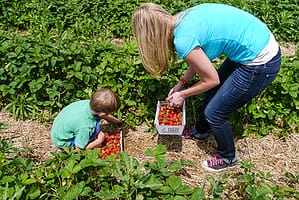
Unfortunately, however, they’ve also just reached the number-one spot on the “Dirty Dozen,” or rankings released by the Environmental Working Group (EWG) of foods with the highest pesticide residue — even after they’ve been picked, rinsed in the field, and washed before eating.
Strawberries tested by scientists at the U.S. Department of Agriculture in 2009 and 2014 bore an average of 5.75 different pesticides per sample. What’s more, strawberry growers use jaw-dropping volumes of poisonous gases to sterilize their fields before planting, according to the EWG.
While there’s scant research when it comes to the link between these pesticides and gases and addiction — it can’t hurt to do all you can to keep your body free and clean of any toxins. After all, it’s already fragile and working overtime to repair the damage from years of addiction.
The “Dirty Dozen”
You don’t want to stop eating colorful, vitamin-rich foods, but you do want to choose wisely. The EWG suggests going organic when it comes to the following produce:
- Strawberries
- Apples
- Nectarines
- Peaches
- Celery
- Grapes
- Cherries
- Spinach
- Tomatoes
- Sweet bell peppers
- Cherry tomatoes
- Cucumbers
The “Clean 15”
These foods are practically pesticide-free, according to the EWR.
- Avocados
- Sweet Corn
- Pineapples
- Cabbage
- Sweet peas frozen
- Onions
- Asparagus
- Mangos
- Papaya
- Kiwi
- Eggplant
- Honeydew Melon
- Grapefruit
- Cantaloupe
- Cauliflower
Nutritional Therapy at Red Oak Recovery®
The Red Oak Recovery® nutritional therapy program, as part of our drug and alcohol rehab, approaches food and eating holistically. Clients are taught horticulture skills and cooking techniques, and they get to enjoy the fruits of their labors with every meal. To learn more, call 866.457.7426.








